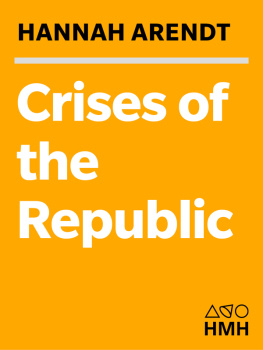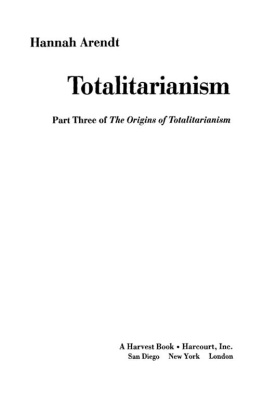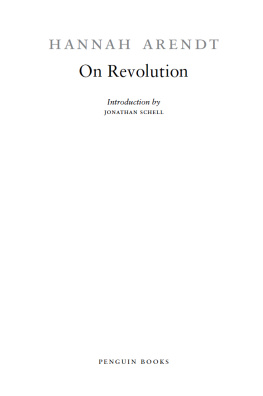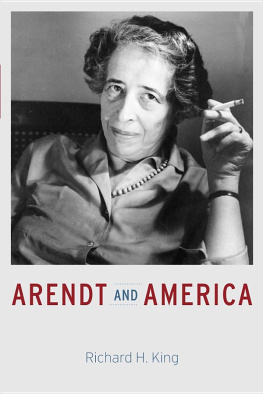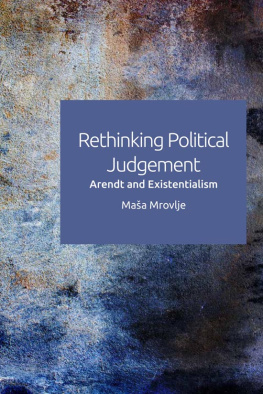Copyright 1972, 1971, 1970, 1969 by Hannah Arendt
All rights reserved. No part of this publication may be reproduced or transmitted in any form or by any means, electronic or mechanical, including photocopy, recording, or any information storage and retrieval system, without permission in writing from the publisher.
For information about permission to reproduce selections from this book, write to Permissions, Houghton Mifflin Harcourt Publishing Company, 215 Park Avenue South, New York, New York 10003.
www.hmhbooks.com
Civil Disobedience originally appeared, in somewhat different form, in the New Yorker. Versions of the other essays originally appeared in the New York Review of Books.
ISBN 0-15-623200-6 (Harvest/pbk.)
Library of Congress Catalog Card Number: 72-187703
eISBN 978-0-547-70515-6
v2.0513
For Mary McCarthy in Friendship
Lying in Politics
Reflections on the Pentagon Papers
The picture of the worlds greatest superpower killing or seriously injuring a thousand non-combatants a week, while trying to pound a tiny backward nation into submission on an issue whose merits are hotly disputed, is not a pretty one.
Robert S. McNamara
I
THE PENTAGON PAPERS as the forty-seven-volume History of U.S. Decision-Making Process on Vietnam Policy (commissioned by Secretary of Defense Robert S. McNamara in June 1967 and completed a year and a half later) has become known ever since the New York Times published, in June 1971, this top-secret, richly documented record of the American role in Indochina from World War II to May 1968tell different stories, teach different lessons to different readers. Some claim they have only now understood that Vietnam was the logical outcome of the Cold War or the anti-Communist ideology, others that this is a unique opportunity to learn about decision-making processes in government, but most readers have by now agreed that the basic issue raised by the papers is deception. At any rate, it is quite obvious that this issue was uppermost in the minds of those who compiled The Pentagon Papers for the New York Times, and it is at least probable that this was also an issue for the team of writers who prepared the forty-seven volumes of the original study. The famous credibility gap, which has been with us for six long years, has suddenly opened up into an abyss. The quicksand of lying statements of all sorts, deceptions as well as self-deceptions, is apt to engulf any reader who wishes to probe this material, which, unhappily, he must recognize as the infrastructure of nearly a decade of United States foreign and domestic policy.
one is easily tempted to forget the background of past history, itself not exactly a story of immaculate virtue, against which this newest episode must be seen and judged.
Secrecywhat diplomatically is called discretion, as well as the arcana imperii, the mysteries of governmentand deception, the deliberate falsehood and the outright lie used as legitimate means to achieve political ends, have been with us since the beginning of recorded history. Truthfulness has never been counted among the political virtues, and lies have always been regarded as justifiable tools in political dealings. Whoever reflects on these matters can only be surprised by how little attention has been paid, in our tradition of philosophical and political thought, to their significance, on the one hand for the nature of action and, on the other, for the nature of our ability to deny in thought and word whatever happens to be the case. This active, aggressive capability is clearly different from our passive susceptibility to falling prey to error, illusion, the distortions of memory, and to whatever else can be blamed on the failings of our sensual and mental apparatus.
Hence, when we talk about lying, and especially about lying among acting men, let us remember that the lie did not creep into politics by some accident of human sinfulness. Moral outrage, for this reason alone, is not likely to make it disappear. The deliberate falsehood deals with contingent facts; that is, with matters that carry no inherent truth within themselves, no necessity to be as they are. Factual truths are never compellingly true. The historian knows how vulnerable is the whole texture of facts in which we spend our daily life; it is always in danger of being perforated by single lies or torn to shreds by the organized lying of groups, nations, or classes, or denied and distorted, often carefully covered up by reams of falsehoods or simply allowed to fall into oblivion. Facts need testimony to be remembered and trustworthy witnesses to be established in order to find a secure dwelling place in the domain of human affairs. From this, it follows that no factual statement can ever be beyond doubtas secure and shielded against attack as, for instance, the statement that two and two make four.
It is this fragility that makes deception so very easy up to a point, and so tempting. It never comes into a conflict with reason, because things could indeed have been as the liar maintains they were. Lies are often much more plausible, more appealing to reason, than reality, since the liar has the great advantage of knowing beforehand what the audience wishes or expects to hear. He has prepared his story for public consumption with a careful eye to making it credible, whereas reality has the disconcerting habit of confronting us with the unexpected, for which we were not prepared.
Under normal circumstances the liar is defeated by reality, for which there is no substitute; no matter how large the tissue of falsehood that an experienced liar has to offer, it will never be large enough, even if he enlists the help of computers, to cover the immensity of factuality. The liar, who may get away with any number of single falsehoods, will find it impossible to get away with lying on principle. This is one of the lessons that could be learned from the totalitarian experiments and the totalitarian rulers frightening confidence in the power of lyingin their ability, for instance, to rewrite history again and again to adapt the past to the political line of the present moment or to eliminate data that did not fit their ideology. Thus, in a socialist economy, they would deny that unemployment existed, the unemployed person simply becoming a nonperson.
The results of such experiments when undertaken by those in possession of the means of violence are terrible enough, but lasting deception is not among them. There always comes the point beyond which lying becomes counterproductive. This point is reached when the audience to which the lies are addressed is forced to disregard altogether the distinguishing line between truth and falsehood in order to be able to survive. Truth or falsehoodit does not matter which any more, if your life depends on your acting as though you trusted; truth that can be relied on disappears entirely from public life, and with it the chief stabilizing factor in the ever-changing affairs of men.
To the many genres in the art of lying developed in the past, we must now add two more recent varieties. There is, first, the apparently innocuous one of the public-relations managers in government who learned their trade from the inventiveness of Madison Avenue. Public relations is but a variety of advertising; hence it has its origin in the consumer society, with its inordinate appetite for goods to be distributed through a market economy. The trouble with the mentality of the public-relations man is that he deals only in opinions and good will, the readiness to buy, that is, in intangibles whose concrete reality is at a minimum. This means that for his inventions it may indeed look as though the sky is the limit, for he lacks the politicians power to act, to create facts, and, thus, that simple everyday reality that sets limits to power and brings the forces of imagination down to earth.
Next page
